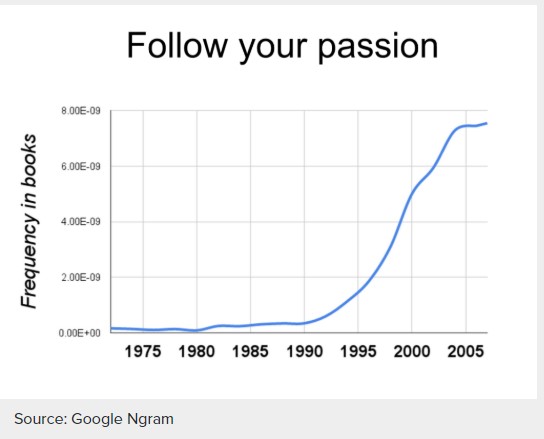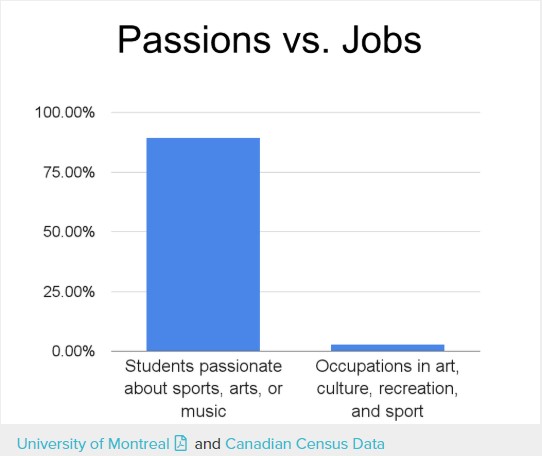It’s hard to get useful career advice because finding a job you love is impossible for some and a combination of luck, skill, timing, and who you know for others.
There also aren’t many sources available to offer advice who have thought long and hard about this topic. So most career guidance revolves around platitudes and fortune cookie sayings that sound good in theory but offer zero help in practice.
I don’t have all the answers but I do think it can help to understand which career advice you can safely ignore so as to not waste your time “following your dreams” and such.
Here are some of the worst offenders in terms of useless career advice:
Follow your passion. The folks over at 80,000 hours tallied up the number of times “follow your passion” has been written in a book since 1975:

Plenty of people are passionate about their hobbies but relatively few people are able to turn those passions into an actual paycheck:

Scott Galloway talks about why this is a false premise in his book The Algebra of Happiness:
People who tell you to follow your passion are already rich. They have doggedly pursued a path and have been obsessed with success for a long time. They want to sound inspirational and give you a sound bite, because the truth that success requires sixty- to eighty-hour weeks for several decades doesn’t get applause in graduation speeches.
Nobody starts their career passionate about tax law. But great tax lawyers are passionate about colleagues who admire them, creating economic security for their families, and marrying someone more impressive than they are.
There are a lot of things I’m passionate about that wouldn’t put food on the table for my family. Finding something you’re good at and turning it into a passion by leveraging your skillset to work with the right people at the right organization is a more reasonable path.
I grew into my love for the markets and writing but I didn’t go into this career path because it was something I was passionate about. The passion came much later.
You can be anything you want to be. This motivational phrase always comes with good intentions but it’s not true for 99% of us.
When I was in 5th grade I wanted more than anything to become a professional basketball player. A lack of height, jumping ability and a consistent jumper put an end to those dreams.1 There are only 38 active astronauts at NASA. Not everyone gets to ride in a spaceship just because that was their dream as a child.
Dreaming big is nice but you also have to be realistic. If we all followed our dreams when it came to our career path nothing would ever get done.
Just be happy you have a job in this economy. I hate defeatist advice like this. Is it true for some people? Sure. But if you go into your career with this as your mindset it’s going to be impossible to get ahead.
Ignore the averages when it comes to your career. It doesn’t matter what’s happening with the rest of your demographic, the average income of people your age, the national unemployment rate, current tax rates, which political party is in control or the economic growth of the economy as a whole.
That stuff is all completely out of your control.
Focus on the stuff that matters. Never stop learning and self-improvement. Make yourself irreplaceable on the job. Become such a good employee that you have negotiating power at current or future roles. And don’t just watch out for yourself. Help colleagues and peers when they need it. You never know when you’ll need someone to return the favor.
You’re young. Play it safe. The time to take some risks is when you’re young, have fewer responsibilities, and don’t have it all figured out.
Experimenting and giving yourself a diversification of opportunity can be critical to find out where you fit in the workplace, especially when you’re young. I get a lot of emails from young people asking for advice on transitioning to a different career or job. This is something that happens to a ton of people in their late-20s/early-30s.
So don’t buy a house or stay at a soul-sucking job just because you think you have to when you’re young.
Take some risks. Move to a different city. Take a flier on a job that doesn’t pay as well but gives you more experience or makes you happier on a daily basis.
Just follow these simple steps. I enjoy reading but I’ve never read a book that changed my life. Those book recommendations from CEOs didn’t change their life either.
Getting up at 3:45 am won’t make you a better executive. Neither will transcendental meditation or drinking a green tea or organizing your inbox a certain way.
You can’t master this one skill or follow these 10 simple steps to automatically find the role of a lifetime.
It would be nice if life were this easy. There are no simple steps to get ahead in the workplace. You have to work at it.
Figure out your long-term plan NOW. Jim Simons from Renaissance Technologies has perhaps the greatest investing track record ever. I was surprised to learn through Greg Zuckerman’s book The Man Who Solved The Market that Simons didn’t really hit his stride until his 50s.
In his 40s when Simons was an obscure hedge fund manager still tinkering with his models he said, “Sometimes I look at this and feel I’m just some guy who doesn’t really know what he’s doing.”
Simons was successful in other areas of life but didn’t find his calling until his 5th decade.
Thinking ahead is useful in many realms of life but it’s hard to do when it comes to your career because there are so many variables at play. This is why the “Where do you see yourself in 5 years?” interview question is so bogus.
No one has things all figured out with their career at all times. And that’s okay.
Further Reading:
Accidental Career Guidance
Some Things I Wish I Would Have Learned in College
1But I was still a damn good pass-first point guard and lock-down defender.
